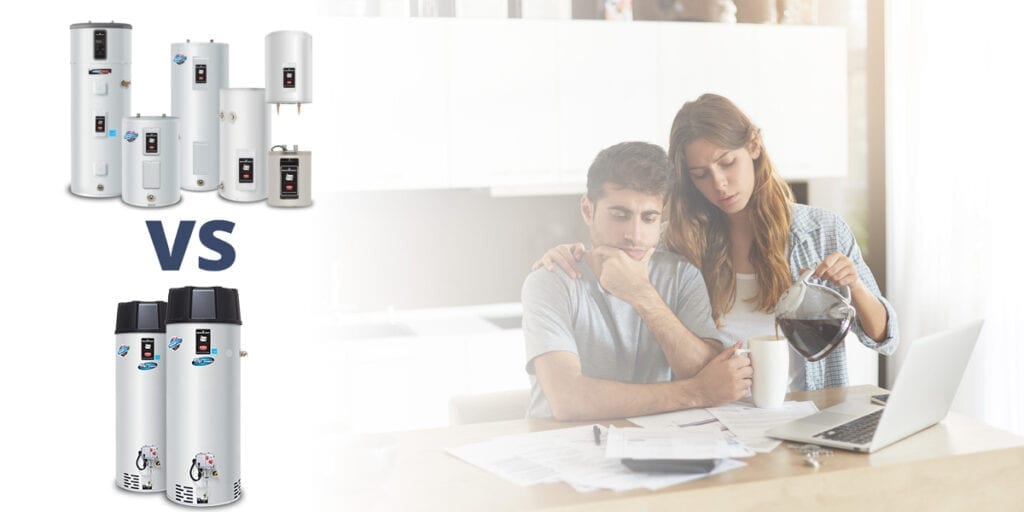Electric or gas powered water heaters?
Both have good and less-desirable features to think about. We summarize the gaps between them so you can make an educated choice on which one will be perfect for your house.
With the typical gas style water heater, you deal with the very slim possibility of a gas flow and, thus, an burst. Also, you’re at a greater chance of getting carbon monoxide leaks in your property. Electric water heaters don’t pose these dangers.
For a gas heater, however, there are dozens and dozens of different versions to pick heaters cost to operate due to the reduced price of gas, electrical heaters are more efficient. This is a result of the manner that the drains function. The gas heater has to vent the burned gas, which also requires a lot of warmth. An electrical heater utilizes nearly all of the energy it receives, turning it into warm water, which means that you have much less waste.
Heater with gasoline or electrical or replacing an electrical one with a different electrical one is generally a simple procedure. A gas heater using a current gas source will be plumbed, the gasoline distribution hooked up, along the port attached.
Secondly, the Sum of If You’ve Got a natural Facts to think about concerning the hot water accessibility between both choices. The first is that the energy source because not every house has access to a gas line. However, almost every home has power.
As long a there isn’t a power outage, you may have access to warm water using an electrical heater. But, gas heaters may also continue to heat your water despite a power outage, as long as the gas supply continues to flow.
When changing from electric to gas in a brand new gas heater set up, the tank has to be plumbed. Also, a gas line has to be run to the new site. Afterward, a port must be built, which might include drilling or cutting into the house’s face. This will increase the cost and time of this setup.
There are two fundamental heaters, electrical costs less to buy but costs more to operate. Electric heaters have significantly fewer components, which accounts for their reduced upfront price. They also tend to be a lot less difficult to set up. Therefore installation costs might also be low. But energy costs are more per month than the identical quantity of electricity from natural gas. So as you pay less up front, then a gasoline heater will cover itself in reduced energy prices with time.
Whether it’s gas or electric, heaters are rather simple to keep. Both ought to be frequently flushed to maintain sediment from building up on the tank’s base, along with then prolonging its lifespan. Some gas tanks might require the vent to be cleaned occasionally because the particulates in the gas build up.
Energy-Efficiency Prices
If you opt for a Gas heater exist and use less energy all around. All these are the only sort of tank heater which has an Energy Star label. Electric tank replacements aren’t offered in a large energy-efficiency design.
Gas heaters will need to vent, so they’re a bit larger around and have plumbing that will have to exit your house, thus limiting their positioning. Electric heaters could be compact, which provides you more placement choices.
Various budgets and requirements. Generally, electrical heaters are much better for your environment since they tend to be energy-efficient and have the chance of being driven through renewable energy resources such as solar and solar power.
Our Best Picks.
A water heater is an incredibly important part of each home and probably something you don’t think about until it quits functioning. Considering that a water heater’s normal lifespan would be between 10 and 20 years, each homeowner will probably have to replace one a few times.
Additionally, there are a few security concerns. When setting up a new heater installation costs for an electric heater will be $700 – $1,000. In contrast, the expense to put in a gas heater ranges from $1,000 to $2,000 based on whether you have a gas line run to the heater and a vent for the waste. This makes the entire cost to get a 40-gallon electrical water heater between $1000 and $1,700 together with the overall expenses of a 40-gallon gas heater between $1,400 and $2,800.
The majority of people are mindful of the dimensions concerning gallons. The more water that the tank stays, the bigger it’ll generally be. Both gas and electric heaters come in numerous sizes in 20 to 100 gallons. But electrical heaters can also be accessible as a point of source replacements. You can install a small water heater right at a tap to give hot water demand for items such as tea.
Home Size an water tank size affect your choice for a water heater. This will be contingent on just how much heat you require, how large your house is, just how much money you use, along with also the amount of electricity or gas in your town. Generally, however, data show a gas water heater may probably cost approximately $30per month for your average residence, while a gas heater may probably cost you closer to $42.
Another thing to think about is how much hot water the tank will create in the first hour of usage, known as the first-hour score (FHR). Both electric and gas tanks possess a variety of FHR values. A greater number means that there will be water available immediately. But, gas tanks tend to heat up quicker than electrical heaters, which means that you may frequently find increased FHR on a gasoline heater.




